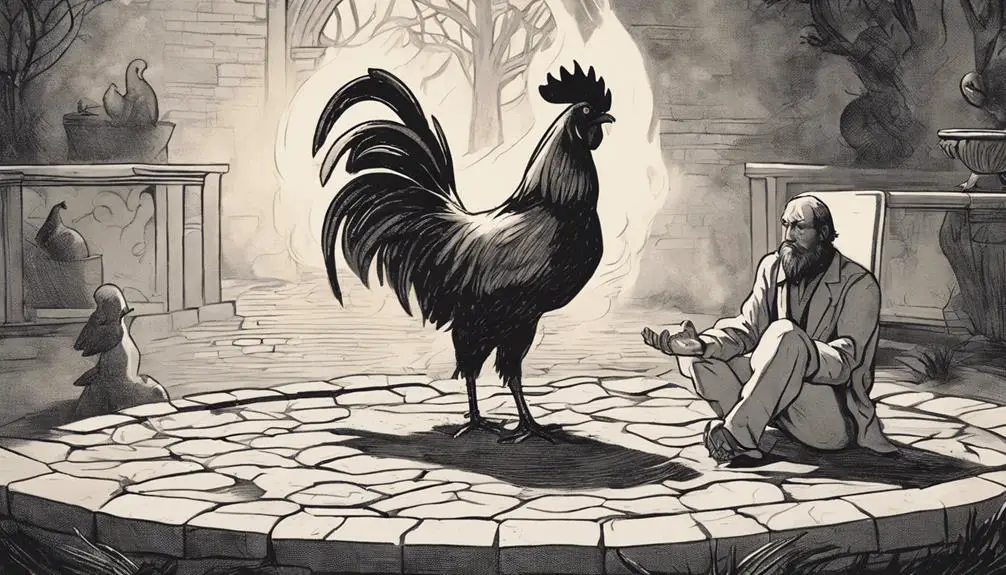See how biblical tales of Adam, Cain, and others reveal the lasting impact of wrong choices, inviting reflection on our own paths.

Consequences of Wrong Choices in the Bible
Navigating through the Bible is akin to walking through a gallery of human history, where each portrait vividly illustrates the consequences of wrong choices. You'll encounter Adam and Eve's loss of paradise due to disobedience, Cain's life marred by the mark of jealousy, Solomon's wisdom clouded by idolatry, Jonah's detour inside a whale's belly, and Peter's bitter regret after denial.
These stories aren't just ancient tales; they're poignant reminders of the ripple effects our decisions can have. Let's explore how these narratives can offer valuable lessons for your life today, leaving you to ponder on the weight of your choices.
Key Takeaways
- Disobedience to divine commands leads to separation from God and dire consequences.
- Unchecked emotions, such as envy and anger, escalate conflicts and result in devastating outcomes.
- Compromising faith for personal gain incites divine displeasure and impacts communities.
- Personal choices have wider effects, emphasizing the importance of aligning with divine guidance for redemption.
Adam and Eve's Disobedience

Adam and Eve's decision to eat from the Tree of Knowledge, despite divine prohibition, marks a pivotal moment of disobedience that reverberates through biblical teachings. This act is traditionally interpreted as the origin of original sin, a concept fundamental to understanding humanity's inherent flaws and the necessity for divine grace.
Through your analysis, you'll recognize that temptation's role isn't merely as a catalyst for this disobedience but also as a critical component in the narrative that explores human nature's vulnerability to transgression.
Temptation, embodied by the serpent, presents not just a challenge to divine command but also a test of free will and trust. Adam and Eve's yielding to temptation underscores a crucial aspect of human behavior: the propensity to prioritize immediate gratification or curiosity over obedience and foresight. This moment, therefore, doesn't just represent a singular act of defiance; it sets the stage for the enduring theme of temptation and sin in human history.
The repercussions of their choice illustrate a profound theological principle: actions have consequences, and disobedience to divine will leads to separation from God. This narrative, rich in symbolism, offers a foundational lesson on the perils of succumbing to temptation and the profound impact of what's deemed original sin.
Cain's Jealous Rage
In the aftermath of Adam and Eve's fall, the narrative of Cain's jealous rage emerges as a poignant illustration of how envy and anger can lead to catastrophic outcomes. This story, deeply entrenched in themes of sibling rivalry and divine punishment, offers a critical exploration of human nature and morality.
Let's delve into the consequences of Cain's actions through a succinct analysis:
- Manifestation of Sibling Rivalry: Cain's inability to manage his jealousy towards Abel's favor with God underscores the destructive power of sibling rivalry. This envy not only strains familial bonds but also catalyzes a series of regrettable decisions.
- Act of Murder: The culmination of Cain's jealousy results in the ultimate transgression, the murder of his brother Abel. This act is a stark testament to how unchecked emotions can escalate into irreversible actions.
- Divine Punishment: Cain's actions lead to divine punishment, illustrating the biblical principle that wrongful acts have consequences. His banishment serves as a reminder of the importance of curbing destructive emotions and adhering to moral conduct.
Through Cain's story, we're shown the profound impact of personal choices, particularly how envy and unchecked rage can lead to devastating consequences, emphasizing the need for vigilance in our moral and emotional lives.
Solomon's Idolatry

Why did Solomon, despite his wisdom, succumb to the allure of idolatry, leading to far-reaching consequences for the kingdom of Israel? Solomon's wisdom, renowned throughout ancient texts, positioned him as a figure of immense intellectual and spiritual capacity. He embarked on grand projects, notably the Temple construction, which cemented his legacy as a devout leader. However, his spiritual journey took a detrimental turn.
Solomon's alliances through marriage to foreign princesses introduced and even endorsed idolatrous practices within Israel. This strategic move, aimed at securing political stability and economic prosperity, paradoxically sowed the seeds of spiritual downfall. You see, Solomon didn't merely tolerate his wives' religions; he actively participated in idolatry, constructing high places for these deities.
This deviation from monotheism wasn't just a personal failing; it had national implications. Solomon's idolatry incited divine displeasure, leading to a prophecy of the kingdom's division. His actions illustrate a profound truth: even the wisest can falter, and their choices can shape the destiny of entire nations. Solomon's story serves as a cautionary tale about the dangers of compromising one's faith and the lasting impact of our decisions on our legacy and community.
Jonah's Flight
Jonah's decision to flee from God's command epitomizes the struggle between divine directive and human will, leading to significant repercussions for himself and others. By choosing his path over divine instruction, Jonah not only endangered his life but also those around him.
The narrative highlights three pivotal moments where Jonah's choices catalyze divine intervention and nautical peril:
- Divine Intervention: Jonah's attempt to escape God's command precipitates a series of supernatural events. His defiance triggers a divine response, underscoring the inescapability of divine will and the futility of human resistance against it.
- Nautical Peril: Jonah's presence on the ship heading to Tarshish brings about a violent storm, endangering the lives of all aboard. This incident exemplifies the broader impact of individual disobedience on others, illustrating how personal choices can extend beyond individual consequences to affect innocent bystanders.
- Reluctant Compliance: Ultimately, Jonah's journey illustrates the infeasibility of fleeing from divine responsibilities. His eventual compliance, albeit reluctant, results in the fulfillment of God's directive but only after unnecessary hardship and divine intervention to correct his course.
Jonah's flight serves as a profound lesson in the importance of aligning personal will with divine guidance to avert unnecessary tribulations.
Peter's Denial

Reflecting on Jonah's lesson on the repercussions of defying divine will, we now turn our attention to another biblical narrative, Peter's Denial, which similarly underscores the complex interplay between human frailty and spiritual fidelity. Peter's denial of Jesus, as foretold, marks a critical moment of weakness and fear. Yet, it's this very incident that sets the stage for a profound repentance journey, illustrating not just the pitfalls of human nature but also the boundless capacity for forgiveness and transformation within the divine framework.
Analyzing Peter's trajectory from denial to remorse and ultimately to leadership restoration, we observe a fundamental principle at work: repentance isn't merely an act of seeking forgiveness but an essential process of spiritual growth and self-realization. Peter's journey underscores the notion that leadership, especially spiritual leadership, is honed not in perfection but through the crucible of failure, humility, and the relentless pursuit of redemption.
Thus, Peter's story serves as a poignant reminder of the grace that awaits on the other side of our missteps, provided we're willing to confront them with honesty and a heart inclined towards repentance. Through his example, we learn that our greatest failures can indeed become the bedrock of our most profound leadership restoration.
Frequently Asked Questions
How Does Modern Psychological Research Interpret the Decision-Making Processes of Biblical Figures Like Adam, Eve, Cain, Solomon, Jonah, and Peter?
Modern psychological research delves into the decision-making of biblical figures like Adam, Eve, Cain, Solomon, Jonah, and Peter by exploring the neurological basis behind their actions.
This approach reveals patterns of human behavior that show cultural universality, suggesting these stories capture fundamental aspects of the human condition.
In What Ways Have Different Cultures and Religions Outside of Christianity Interpreted These Stories of Wrong Choices in the Bible?
You're diving into how various cultures and religions view biblical stories, moving from mythological parallels to historical accuracy debates. It's like comparing apples to oranges, yet both fruitfully enrich understanding.
Different traditions interpret these narratives through their lenses, focusing on moral lessons or historical contexts. This analytical journey reveals diverse perceptions, showing that while the stories remain constant, interpretations are as varied as the cultures examining them.
How Have These Biblical Stories of Wrong Choices Been Depicted in Contemporary Media, Such as Films, Music, and Literature, and What Impact Do These Portrayals Have on Society's Understanding of Moral and Ethical Dilemmas?
In contemporary media, biblical stories of wrong choices are often explored with varying degrees of cinematic accuracy and moral adaptation. You'll find these narratives in films, music, and literature, reshaping society's grasp on moral and ethical dilemmas.
This portrayal impacts your understanding by either reinforcing traditional interpretations or challenging them through modern lenses. It's a complex interplay between staying true to the original tale and adapting it to resonate with today's audiences.
What Are the Theological Implications of Free Will and Predestination in the Context of These Stories, and How Have Various Christian Denominations Debated These Concepts Based on the Consequences of the Characters' Actions?
You're navigating a tightrope between divine sovereignty and human responsibility, exploring how free will and predestination interplay.
Various Christian denominations have long debated these concepts, dissecting the theological implications within their faith's framework.
This analysis isn't just academic; it shapes how believers understand their actions and God's role in their lives.
Your journey through these debates unveils the complexity of balancing God's control with personal choice.
How Can the Lessons Learned From the Consequences of Wrong Choices in the Bible Be Applied to Current Global Issues Such as Environmental Stewardship, Social Justice, and International Relations?
You can apply lessons from biblical stories to tackle climate change, economic inequality, social justice, and international relations today. By understanding the importance of ethical decisions and their long-term impacts, you're better equipped to address these global challenges.
Analyzing these narratives provides insights into responsible environmental stewardship, the fight against economic disparities, and fostering peaceful international cooperation, emphasizing how making the right choices now can avert dire consequences in the future.
Conclusion
In analyzing biblical narratives, one observes that wrong choices invariably lead to dire consequences. Consider Jonah's flight: his attempt to evade God's command precipitated a storm, endangering lives and culminating in his ingestion by a great fish.
This exemplifies the broader principle that disobedience to divine directives results in turmoil, both internally and externally. Such accounts serve as cautionary tales, underscoring the importance of aligning one's actions with moral and spiritual principles to avoid adverse outcomes.



Sign up